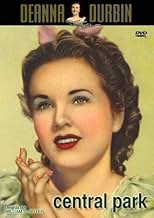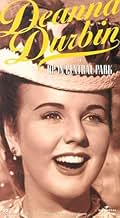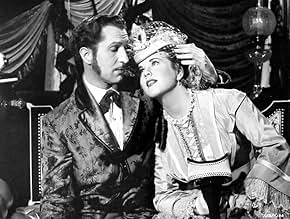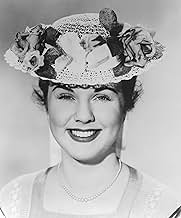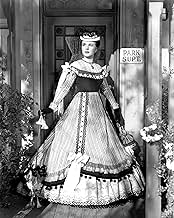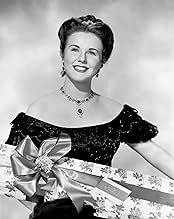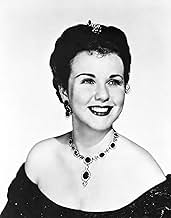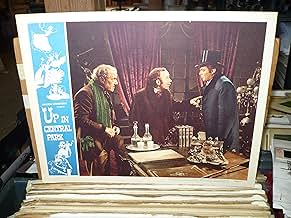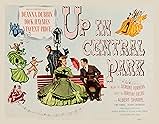Füge eine Handlung in deiner Sprache hinzuA newspaper reporter and the daughter of an immigrant maintenance man help expose political corruption in New York City.A newspaper reporter and the daughter of an immigrant maintenance man help expose political corruption in New York City.A newspaper reporter and the daughter of an immigrant maintenance man help expose political corruption in New York City.
Nellie Fisher
- Dancer
- (as Nelle Fisher)
Boyd Ackerman
- Policeman
- (Nicht genannt)
Patricia Alphin
- Guest
- (Nicht genannt)
Alice Backes
- Swedish Immigrant Girl
- (Nicht genannt)
G. Pat Collins
- Ward Heeler
- (Nicht genannt)
Empfohlene Bewertungen
Despite not featuring in the top billing, this film really belongs to the honest emigrant Irishman "Moore" (Albert Sharpe). Straight off the boat with his feisty daughter "Rosie" (Deanna Durbin) he bumps into a welcoming committee that lets him know how he can take part in the democratic process (for a new mayor) and make a few bucks at the same time. He excels at his task and by a quirk of fate finds himself superintendent of Central Park - on a wapping great $3,000k per year! He is hands on, so likes to feed the animals - an activity that is clearly prohibited and attracts the attention of journalist "Matthews" (Dick Haymes). Realising the man's job and the purpose of the feeding - geese, grouse, duck all destined for the table of kingpin "Tweed" (Vincent Price), he writes a column, gets "Moore" fired and rouses the wrath of "Rosie" who intercedes for her father and also manages to attract the attention of "Tweed" too. It's quite a fun tale of corrupt local politics, naivety and integrity this, with Sharpe delivering well and Durbin doing the lively characterisation that she always did engagingly, too. Price makes for a reasonable sophisticate-cum-power-broker and Hobart Cavanaugh also chips in nicely as the hapless Mayor just doing what he is told. The ending is all a bit rushed, the story is really quite incomplete on a number of fronts and the musical numbers don't do a great deal for maintaining the pace, but it has a certain plausibility to it. It's quite possible this is what New York might have been like at the start.
Up In Central Park marked a successful return to Broadway for Sigmund Romberg as this musical about the Tammany Hall era of Boss William Marcy Tweed ran for 504 performances during the 1945-46 season on Broadway. Instead of the elegant Vincent Price as the powerful Boss of Tammany Hall Civil War and post Civil War, the part was played by Noah Beery, Sr. Now that certainly would have called for a different kind of Boss Tweed.
Musically what Universal Studios gave us is a half baked version of the Broadway Show. Dick Haymes and Deanna Durbin are in good voice for th Sigmund Romberg-Dorothy Fields numbers still left, but because the music is cut the emphasis of the film turns to Price.
Young Deanna Durbin and her father Albert Sharpe are freshly arrived from Ireland and immediately as was the tradition back in the day, welcomed to the shores by the Tammany political machine. Sharpe takes to the repeat voting the way that Brian Donlevy did in The Great McGinty, but his rise only consists of becoming the superintendent of Central Park which the Tweed Ring plans to 'improve' with many kickbacks for themselves.
In the meantime Durbin comes to the attention of Price, but she also comes to the attention of crusading reporter Dick Haymes. They make beautiful music together and apart in what little is left of the Romberg-Fields score.
If Up In Central Park had been done at MGM it surely would have gotten the production needed for this musical. Unforgivably the big hit song of the film Close As Pages In A Book was not performed and it's a duet which I'm sure Haymes and Durbin would have been great at. I'm betting it ended on the cutting room floor. Close As Pages In A Book is heard on the soundtrack as background music
There's another nice song called It Doesn't Cost You Anything To Dream that was also cut. But what I was most disappointed in was a number called The Fireman's Bride that was not included. It's a rollicking number that I have a recording of Jeanette MacDonald and Robert Merrill doing and I'm sure it must have been great on stage. When it wasn't in the film I was truly disappointed.
Casting Vincent Price as Tweed was a stroke of genius. I truly think that a young woman's virtue would have been far more in danger from him than from Noah Beery. Remembering the villains Beery played on screen, he would have to get really overbearing and physical which he must have on stage.
As a musical Up In Central Park is disappointing, but fans of Vincent Price will appreciate this actor displaying the fact he could do far more than horror films.
Musically what Universal Studios gave us is a half baked version of the Broadway Show. Dick Haymes and Deanna Durbin are in good voice for th Sigmund Romberg-Dorothy Fields numbers still left, but because the music is cut the emphasis of the film turns to Price.
Young Deanna Durbin and her father Albert Sharpe are freshly arrived from Ireland and immediately as was the tradition back in the day, welcomed to the shores by the Tammany political machine. Sharpe takes to the repeat voting the way that Brian Donlevy did in The Great McGinty, but his rise only consists of becoming the superintendent of Central Park which the Tweed Ring plans to 'improve' with many kickbacks for themselves.
In the meantime Durbin comes to the attention of Price, but she also comes to the attention of crusading reporter Dick Haymes. They make beautiful music together and apart in what little is left of the Romberg-Fields score.
If Up In Central Park had been done at MGM it surely would have gotten the production needed for this musical. Unforgivably the big hit song of the film Close As Pages In A Book was not performed and it's a duet which I'm sure Haymes and Durbin would have been great at. I'm betting it ended on the cutting room floor. Close As Pages In A Book is heard on the soundtrack as background music
There's another nice song called It Doesn't Cost You Anything To Dream that was also cut. But what I was most disappointed in was a number called The Fireman's Bride that was not included. It's a rollicking number that I have a recording of Jeanette MacDonald and Robert Merrill doing and I'm sure it must have been great on stage. When it wasn't in the film I was truly disappointed.
Casting Vincent Price as Tweed was a stroke of genius. I truly think that a young woman's virtue would have been far more in danger from him than from Noah Beery. Remembering the villains Beery played on screen, he would have to get really overbearing and physical which he must have on stage.
As a musical Up In Central Park is disappointing, but fans of Vincent Price will appreciate this actor displaying the fact he could do far more than horror films.
Not a bad film, in fact quite good, just a little underwhelming at the same time. It has a lot of things to like, there are a lot of omissions(We'll be close as Pages in a Book- though it's used as a cue at the end- and Fireman's Bride being the glaring omissions) but the music is still absolutely beautiful, the sprightly Oh Say, Can You See standing out. Pace, Pace Mio Dio from La Forza Del Destino is beautifully sung and is one of Verdi's best but most difficult soprano arias. The script is delightfully witty, and the story while not the most exceptional in the world is compelling. The choreography and dancing is professional and danced with elegance. In terms of scenes, Durbin's and Price's scenes are a joy but the highlight is the great Currier and Ives ballet. Deanna Durbin is just radiant and brings girlish naiveté to good effect, she's in great voice too, love the richness. Vincent Price is perfectly cast, while he's at his best in the menacing yet sympathetic roles he'd take on later it's easy to love how suave, handsome, smarmy and charismatic he is. Albert Sharpe is also good. Other than the omissions of some of the best songs of Up in Central Park or reducing them to musical cues, the scant length and Dick Haymes' at times likable but stiff performance(he does have a nice voice though and in all fairness his material is not as juicy as Durbin's and Price's), it's in the production values where Up in Central Park falls down most on. The costumes are fine, but the sets are rather stuffy and the use of locations are far too restricted, any opportunities of seeing the locations properly are not used to full effect and the likes of the zoo and carousel are only seen in as much as a few shots. In conclusion, a pleasant film and a good vehicle for Durbin(essentially what it was billed as)- though Price comes extremely close to stealing the show from under her- but at the same time it's disappointing. 6/10 Bethany Cox
Question: Who is the most famous/infamous political boss in U.S. History? I suspect that out of ten informed people, the name pops up is William M. Tweed, Tammany Hall Sachem from 1863 to 1874 (when circumstances forced him to resign). Tweed held many important posts in his years of ... public service. He was a city Commissioner, an alderman, a New York State Senator. He was even (for only one term in the middle 1850s) a Congressman in Washington. He was also a bank director and a corporation director. He is, of course, best remembered for supposedly looting the city of New York out of between forty and two hundred million dollars in fraudulent contracts and kickback schemes. Tweed was sent to prison in 1874, escaped in 1875, was recaptured in Spain in 1876 and returned to the U.S., and died in prison in 1878.
There have been dozens of political bosses in our nation's history. Senator Marcus Hanna, who helped make his friend William McKinley President, can be an example of a successful boss (although a relatively honest and honorable one). Matt Quay of Pennsylvania was another. But only historians remember Hanna or Quay or Frank Hague of New Jersey or Nelson Aldrich of Rhode Island. Tweed stands out because of one man: the cartoonist Thomas Nast. Nast was a genius in political cartooning (even now his best work is still effective, 102 years after his death and 133 years after his Tweed cartoons got really underway). He took the fat, somewhat vulgar looking Tweed and made him look like the human image of greed (it helped that the name and the word rhymed). It immortalized cartoonist and subject no matter what. Tweed had three or four successors as head of Tammany Hall. At least two of them, Richard Croker and Charles Murphy, were more important and powerful than Tweed ever was. Nobody thinks of them when the term "TAMMANY HALL" comes up - they think of Tweed.
Is this image fair? Most historians follow Gustavus Myers account of the Tweed Rings rise and fall to this day (from Myers book on Tammany Hall). Only recently has a dent been put into this account. In 1977 TWEED'S NEW YORK was written by Leo Hershkovits, and he pointed out that Tweed was working for the interests of all the newly arriving immigrant groups struggling to get settled in the U.S. He was also backing civic improvements like the Brooklyn Bridge, the Metropolitan Museum of Art, Prospect and Central Parks, the first attempt at a New York Subway system. His enemies suggested that his interest was in the boodling contracts he and his cohorts gave out, but those same enemies were quite hostile to immigrants (many were former Know Nothings)and most came from the rich part of society. Also many were Republicans, or ambitious Democrats with shady pasts they tried to hide (Samuel Tilden, the future Governor of New York and Presidential Candidate, had been a supporter of the southern Democratic views of slavery and states rights in the Civil War. Tilden and Tweed were enemies). Herkovits may overstate the case but he does reduce the legend a bit. The nature of political life in Tammany was to make profitable deals, and they depended on the immigrants for votes. However the evidence of the large scale thefts is simply not there. The worst example of it, the "Tweed" Courthouse behind City Hall in Manhattan, overran the original two million dollar cost estimate by thirteen million dollars more. It still suggests great corruption, but not the two hundred million losses Myers throws out. I might add that Tweed Courthouse more than has repaid it's original costs. If you watch LAW AND ORDER in one of its various guises, scenes in the courts are shot in that building.
Believe it or not there have only been two films dealing at all with Boss Tweed. More recently Jim Broadbent played Tweed in Scorsese's GANGS OF NEW YORK. He played him as in cahoots with powerful thug (and nativist!) Bill the Butcher Cutter (Daniel Day-Lewis). Bill the Butcher was based on a real thug and killer, Bill "the Butcher" Poole, who was killed by rival gangsters at the Stanwix Hall Saloon in 1857 (six years before the Civil War Draft Riots the film presents). Tweed would never have been allied with Poole, as Poole belonged to the American Party, not the Democrats. However, Broadbent's Tweed at least looked more like the genuine article physically than his one predecessor.
Tweed weighed over three hundred pounds (his death was hastened by diabitis). The actor playing Boss Tweed in UP IN CENTRAL PARK was Vincent Price, playing him like a handsome, powerful (and powerhungry) man. In his dressing gown, entertaining Deanna Durbin (an Irish immigrant lass with education, who learns that Tweed is out for his own good before anyone else), Price is smooth and cultured. No doubt Tweed was intelligent, but his taste in art and literature probably did not match Price's characterization. One wishes Price had tackled the role later in his career (say about the time he did Matthew Hopkins in THE CONQUEROR WORM), and possibly he could have fit the role properly. It is hard to say. He did not match the real Tweed. This is not to say that he is acting poorly. His performance gives the film some zest, and even honesty (when he falls he admits to Durbin that he was brought up to believe that you took what you want). And to be fair, Price's Tweed has enough guts to remain and face the consequences while his accomplices, Governor Motley (Thurston Hall) and Mayor Oakley run off. By the way, Tweed's allied Governor was Governor John T.Hoffman (the last New York City Mayor to rise to the state's Governorship) and the Mayor was Mayor Oakley Hall.
The Sigmund Romberg score for UP IN CENTRAL PARK is not one of his best, and parts of it have been deleted. There was a number about Central Park (where Durbin's father has a job through Tweed) called, "It's the Big Backyard of the City". Price also has a song, "Would You Like to See MY CURRIER & IVES" which is reduced to the song cue in the dialogue, before a scene ends. Durbin does her best, but it is not her best film. It is a mediocre movie, which is best seen to remind oneself of the story of Tweed and his fall, and how it still needs a master film maker to tell it properly.
There have been dozens of political bosses in our nation's history. Senator Marcus Hanna, who helped make his friend William McKinley President, can be an example of a successful boss (although a relatively honest and honorable one). Matt Quay of Pennsylvania was another. But only historians remember Hanna or Quay or Frank Hague of New Jersey or Nelson Aldrich of Rhode Island. Tweed stands out because of one man: the cartoonist Thomas Nast. Nast was a genius in political cartooning (even now his best work is still effective, 102 years after his death and 133 years after his Tweed cartoons got really underway). He took the fat, somewhat vulgar looking Tweed and made him look like the human image of greed (it helped that the name and the word rhymed). It immortalized cartoonist and subject no matter what. Tweed had three or four successors as head of Tammany Hall. At least two of them, Richard Croker and Charles Murphy, were more important and powerful than Tweed ever was. Nobody thinks of them when the term "TAMMANY HALL" comes up - they think of Tweed.
Is this image fair? Most historians follow Gustavus Myers account of the Tweed Rings rise and fall to this day (from Myers book on Tammany Hall). Only recently has a dent been put into this account. In 1977 TWEED'S NEW YORK was written by Leo Hershkovits, and he pointed out that Tweed was working for the interests of all the newly arriving immigrant groups struggling to get settled in the U.S. He was also backing civic improvements like the Brooklyn Bridge, the Metropolitan Museum of Art, Prospect and Central Parks, the first attempt at a New York Subway system. His enemies suggested that his interest was in the boodling contracts he and his cohorts gave out, but those same enemies were quite hostile to immigrants (many were former Know Nothings)and most came from the rich part of society. Also many were Republicans, or ambitious Democrats with shady pasts they tried to hide (Samuel Tilden, the future Governor of New York and Presidential Candidate, had been a supporter of the southern Democratic views of slavery and states rights in the Civil War. Tilden and Tweed were enemies). Herkovits may overstate the case but he does reduce the legend a bit. The nature of political life in Tammany was to make profitable deals, and they depended on the immigrants for votes. However the evidence of the large scale thefts is simply not there. The worst example of it, the "Tweed" Courthouse behind City Hall in Manhattan, overran the original two million dollar cost estimate by thirteen million dollars more. It still suggests great corruption, but not the two hundred million losses Myers throws out. I might add that Tweed Courthouse more than has repaid it's original costs. If you watch LAW AND ORDER in one of its various guises, scenes in the courts are shot in that building.
Believe it or not there have only been two films dealing at all with Boss Tweed. More recently Jim Broadbent played Tweed in Scorsese's GANGS OF NEW YORK. He played him as in cahoots with powerful thug (and nativist!) Bill the Butcher Cutter (Daniel Day-Lewis). Bill the Butcher was based on a real thug and killer, Bill "the Butcher" Poole, who was killed by rival gangsters at the Stanwix Hall Saloon in 1857 (six years before the Civil War Draft Riots the film presents). Tweed would never have been allied with Poole, as Poole belonged to the American Party, not the Democrats. However, Broadbent's Tweed at least looked more like the genuine article physically than his one predecessor.
Tweed weighed over three hundred pounds (his death was hastened by diabitis). The actor playing Boss Tweed in UP IN CENTRAL PARK was Vincent Price, playing him like a handsome, powerful (and powerhungry) man. In his dressing gown, entertaining Deanna Durbin (an Irish immigrant lass with education, who learns that Tweed is out for his own good before anyone else), Price is smooth and cultured. No doubt Tweed was intelligent, but his taste in art and literature probably did not match Price's characterization. One wishes Price had tackled the role later in his career (say about the time he did Matthew Hopkins in THE CONQUEROR WORM), and possibly he could have fit the role properly. It is hard to say. He did not match the real Tweed. This is not to say that he is acting poorly. His performance gives the film some zest, and even honesty (when he falls he admits to Durbin that he was brought up to believe that you took what you want). And to be fair, Price's Tweed has enough guts to remain and face the consequences while his accomplices, Governor Motley (Thurston Hall) and Mayor Oakley run off. By the way, Tweed's allied Governor was Governor John T.Hoffman (the last New York City Mayor to rise to the state's Governorship) and the Mayor was Mayor Oakley Hall.
The Sigmund Romberg score for UP IN CENTRAL PARK is not one of his best, and parts of it have been deleted. There was a number about Central Park (where Durbin's father has a job through Tweed) called, "It's the Big Backyard of the City". Price also has a song, "Would You Like to See MY CURRIER & IVES" which is reduced to the song cue in the dialogue, before a scene ends. Durbin does her best, but it is not her best film. It is a mediocre movie, which is best seen to remind oneself of the story of Tweed and his fall, and how it still needs a master film maker to tell it properly.
As far as I know, this was the last time Deanna Durbin stood before the cameras (even though For The Love of Mary was released some months later, having been shelved for a while). She has gained a few extra pounds, but her voice has also gained weight: the one short operatic excerpt proves that she was becoming a proper soprano with rich, full, operatic voice. It's a pity she doesn't sing more in this film, and also a great pity she didn't pursue career in opera as she quit movies.
Why Universal didn't shoot this in full color and why they cast Dick Haynes, are beyond me. This shouldn't have been a project to save money with, but to spend spend spend! It's very well written and just plain interesting. The story runs smoothly and is quite multidimensional - you can understand most of the characters and their motives, and even the smooth villain becomes rather sympathetic once he explains his views on life to Deanna whom he really seems to cherish. But then again, Vincent Price is at his very best here, sexy and handsome as the Devil, and their scenes with Durbin are really sizzling, so one might turn a blind eye to his evil nature and be lulled into sleep by his silky voice and seductive manners. With Dick Haynes the things get to a halt - he's obviously miscast and seems rather uncomfortable. There's no electricity between him and Deanna.
This film would work well even as a straight picture. The musical numbers are only a few and even though not very memorable, they blend in well with the action. Not at all a bad pastime for Durbin / Price fans.
Why Universal didn't shoot this in full color and why they cast Dick Haynes, are beyond me. This shouldn't have been a project to save money with, but to spend spend spend! It's very well written and just plain interesting. The story runs smoothly and is quite multidimensional - you can understand most of the characters and their motives, and even the smooth villain becomes rather sympathetic once he explains his views on life to Deanna whom he really seems to cherish. But then again, Vincent Price is at his very best here, sexy and handsome as the Devil, and their scenes with Durbin are really sizzling, so one might turn a blind eye to his evil nature and be lulled into sleep by his silky voice and seductive manners. With Dick Haynes the things get to a halt - he's obviously miscast and seems rather uncomfortable. There's no electricity between him and Deanna.
This film would work well even as a straight picture. The musical numbers are only a few and even though not very memorable, they blend in well with the action. Not at all a bad pastime for Durbin / Price fans.
Wusstest du schon
- WissenswertesDuring filming, sepia (brownish) tone was tested in a few scenes, but the released picture is entirely in standard black and white.
- PatzerWhen Timothy Moore is learning to read , he reads from Beatrix Potter's Tale of Peter Rabbit , which wasn't published until 1902 .
- SoundtracksOh Say, Can You See (What I See)
(uncredited)
Music by Sigmund Romberg
Lyrics by Dorothy Fields
Sung by Deanna Durbin
Top-Auswahl
Melde dich zum Bewerten an und greife auf die Watchlist für personalisierte Empfehlungen zu.
Details
- Erscheinungsdatum
- Herkunftsland
- Sprache
- Auch bekannt als
- Quiéreme otra vez
- Drehorte
- Produktionsfirma
- Weitere beteiligte Unternehmen bei IMDbPro anzeigen
- Laufzeit1 Stunde 24 Minuten
- Farbe
- Seitenverhältnis
- 1.37 : 1
Zu dieser Seite beitragen
Bearbeitung vorschlagen oder fehlenden Inhalt hinzufügen

